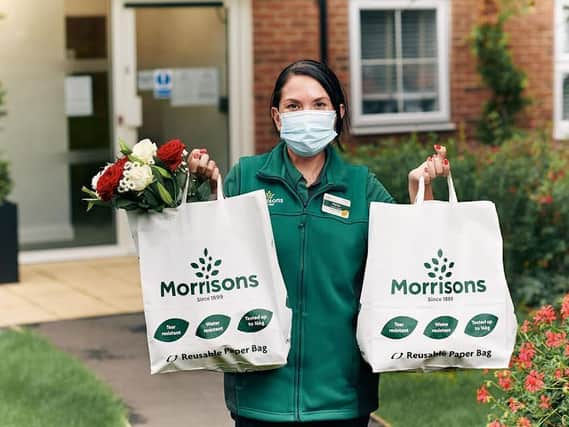UK supermarkets could be on the brink of a price war - Ros Snowdon


I doubt very much that David Potts of Morrisons or Roger Burnley of Asda would be contemplating breaking international law and trying to tear up a deal which they told us was oven-ready and a wonderful thing less than a year ago.
Sadly, we are saddled with the current crop in Westminster and the one good thing about that is Mr Potts, Mr Burnley and the top teams at Tesco, Sainsbury’s, Marks & Spencer, the Co-op, Waitrose and Ocado can carry on with the great job they are doing.
Advertisement
Hide AdAdvertisement
Hide AdThe latest Kantar data shows that shoppers spent £155m less in supermarkets in August following the launch of the Government’s Eat Out to Help Out scheme as people returned to pre-Covid routines.
Low inflation figures on Wednesday support the theory that Chancellor Rishi Sunak’s popular Eat Out to Help Out discount last month was the biggest driver in pushing down the rise in the cost of living by slashing prices in restaurants and cafes.
Last month’s scheme and the Government’s VAT cut helped push UK inflation to its lowest level for nearly five years in August.
The Office for National Statistics said the Consumer Prices Index tumbled from 1 per cent in July to 0.2 per cent in August, which was the lowest rate of inflation since December 2015.
Advertisement
Hide AdAdvertisement
Hide AdBoth bricks and mortar and online retail sales have been affected by the impact of the Eat Out to Help Out scheme.
Kantar said take-home grocery sales rose 10.8 per cent over the past 12 weeks, but growth slowed to 8 per cent in August.
Online grocery growth in the most recent four weeks slowed for the second month in a row to 77 per cent as people ventured out more and shielding came to an end for many.
However, a number of areas in the North have been affected by local lockdowns. Kantar said sales at Co-op rose 13 per cent in the 12 weeks to September 6, but they rose by more than double that in the North, where local lockdowns mean consumers are staying closer to home.
Advertisement
Hide AdAdvertisement
Hide AdFraser McKevitt, head of retail and consumer insight at Kantar, said grocery growth tailed off in August as the Government’s Eat Out to Help Out scheme got underway and people were encouraged to return to offices and resume normal routines.
Fewer meals being eaten at home meant that consumers spent £155m less in the supermarkets in the four weeks to September 6 compared with July.
When asked whether grocery sales will pick up now that the Eat Out to Help Out scheme has ended, Mr McKevitt said there are two competing forces.
If people are eating out less now Mr Sunak’s scheme has ended, they will have to buy more food from the supermarkets to eat at home.
Advertisement
Hide AdAdvertisement
Hide AdHowever, the return to more normal working and living patterns, with children going back to school and workers being encouraged to return to offices, could mean less food is eaten at home.
Mr McKevitt concluded that we will have to wait and see if grocery sales pick up again going forward.
Once again, Kantar said Bradford-based Morrisons was the best performer out of the big four, with sales rising 12.9 per cent.
Market leader Tesco saw a 10.5 per cent increase, followed by Sainsbury’s (up 8.0 per cent) and Leeds-based Asda (up 6.3 per cent).
Advertisement
Hide AdAdvertisement
Hide AdThis is the third time in a row Morrisons has been the fastest growing of the big four and reflects Morrisons’ enormous efforts to help customers during the pandemic - from long lasting price cuts to installing local store community champions.
One bonus that may emerge from the pandemic is that Kantar believes UK supermarkets could start a price war in the run up to the all important Christmas trading period.
As the furlough scheme comes to an end at the end of October and we face an autumn of redundancies, cheaper food could make life that little bit easier for struggling British families.
Comment Guidelines
National World encourages reader discussion on our stories. User feedback, insights and back-and-forth exchanges add a rich layer of context to reporting. Please review our Community Guidelines before commenting.